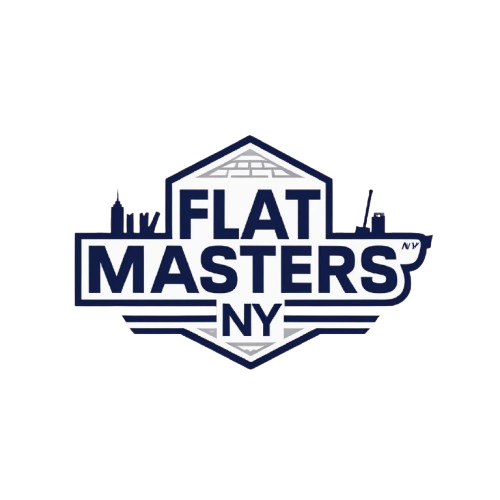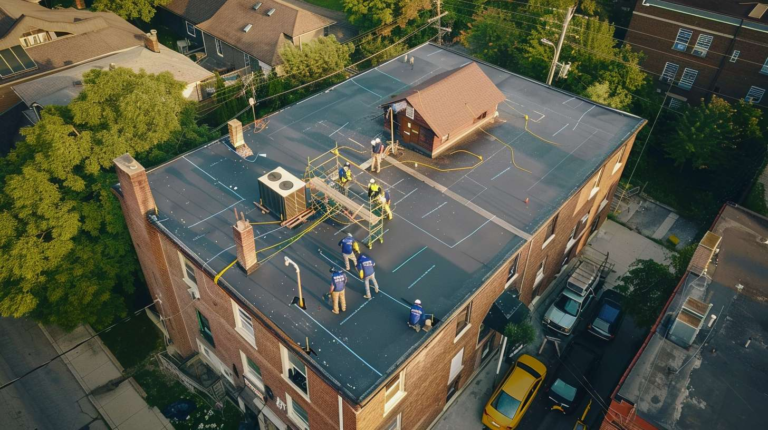Professional Roof Vents for Flat Roofs: Expert Installation Services
Here's the thing about roof vents for flat roofs - they're not optional, they're absolutely essential. After twenty-three years installing and repairing flat roofs across Queens, from Astoria to Jamaica, I've seen what happens when buildings don't have proper ventilation. It's not pretty, and it's definitely not cheap to fix.
Why Flat Roofs Need Specialized Ventilation
Look, flat roofs present unique challenges that your average pitched roof doesn't face. Water pools, heat builds up, and without proper airflow, you're looking at moisture problems that can cost thousands. Just last month on Northern Boulevard, we had to completely replace a section of a commercial roof because inadequate ventilation led to trapped moisture and structural damage.
The key difference with flat roof vents types is that they need to be designed specifically for low-slope applications. You can't just throw any old roof vent up there and call it a day.
Essential Types of Flat Roof Vents
Over the years, I've installed every type of flat roof air vents you can imagine, and honestly, some work better than others in our Queens climate. The salt air from Flushing Bay, the temperature swings we get, the occasional nor'easter - all of this affects how well these systems perform.
Static Roof Vents
These are your workhorses. No moving parts, no electricity needed. We install a lot of these on apartment buildings in Elmhurst and Corona because they're reliable and cost-effective. They work on the principle of natural convection - hot air rises and escapes through the vent while cooler air enters from soffit vents.
The downside? They're not as efficient as powered systems, especially during those still summer days when there's barely any wind.
Powered Exhaust Fans
Now we're talking serious ventilation. These electric units can move massive amounts of air - we're talking 1,000 to 3,000 CFM depending on the size. I installed six of these on a warehouse roof in Long Island City last year, and the difference in interior temperature was immediately noticeable.
The investment is higher - you're looking at $300-800 per unit plus installation - but for commercial applications or buildings with serious heat issues, they're worth every penny. My foreman Tony always says these units pay for themselves in reduced HVAC costs within two years.
Turbine Vents
These spinning units work great when there's wind, but here's what most contractors won't tell you - they can be noisy. I've had customers call me back asking if we can do something about the noise, especially on residential buildings where bedrooms are on the top floor.
Ridge Vents for Low-Slope Applications
These are specialized versions of traditional ridge vents, modified for flat or low-slope roofs. They run along the peak or highest point of the roof structure and provide continuous ventilation. We don't use these as much in Queens because most of our flat roofs are truly flat, but they work well on buildings with slight slopes.
Proper Placement and Installation
Here's where experience really matters. You can't just stick a roof vent for flat roof anywhere and expect it to work properly. We always start with a thorough assessment of the building's layout, existing ventilation, and specific needs.
For optimal performance, exhaust vents should be placed at the highest points of the roof, typically near the center or along the building's ridge line if there is one. Intake vents - and this is crucial - need to be positioned lower than exhaust vents to create proper air circulation.
I can't tell you how many times I've been called to fix ventilation problems caused by poor placement. Just two weeks ago on 108th Street, we had to relocate three vents because the previous contractor had installed them too close together, creating dead zones where air wasn't moving at all.
Common Ventilation Problems We See
After thousands of service calls across Queens, certain issues come up again and again. Blocked vents are probably the most common - leaves, debris, even birds' nests can completely shut down your ventilation system.
But the real problems start when building owners ignore maintenance. Vent screens corrode, especially near the water. Flashing around vent penetrations fails, leading to leaks that can damage the roof deck and interior structure.
Moisture Issues
Poor ventilation leads to condensation problems that most people don't even notice until it's too late. We've torn up sections of flat roofs in Bayside and found completely rotted deck boards because moisture had been trapped for years.
Ice Dam Formation
Yes, even flat roofs can develop ice dam issues. Without proper air circulation, heat builds up unevenly, causing snow to melt and refreeze at drain locations. This is particularly problematic on buildings with HVAC equipment on the roof - a common setup in commercial buildings throughout Queens.
Installation Process and Considerations
When Flat Masters NY installs flat roof roof vents, we follow a systematic approach that starts with calculating the building's ventilation needs. The general rule is one square foot of ventilation for every 150 square feet of roof area, but this varies significantly based on the building's use, insulation, and local climate conditions.
The actual installation involves cutting precise openings in the roof membrane, installing proper flashing systems, and ensuring watertight seals. This isn't DIY territory - one mistake and you're dealing with leak problems that can cost thousands to repair.
We always use high-quality flashing materials and follow manufacturer specifications exactly. Too many contractors cut corners on flashing, and that's where most vent-related leaks originate. Our standard practice includes applying multiple layers of sealant and using mechanical fasteners rated for our wind loads.
Maintenance and Long-Term Performance
Look, installing the vents is just the beginning. Regular maintenance is what keeps them working properly for decades. We recommend inspection and cleaning at least twice a year - spring and fall are ideal times.
During maintenance visits, we check for debris blockage, inspect flashing integrity, verify proper operation of any powered units, and look for signs of pest intrusion. Small issues caught early save major headaches later.
For powered vents, motor replacement is typically needed every 8-12 years depending on usage and exposure conditions. We keep common replacement parts in stock because waiting for special orders means days or weeks without proper ventilation.
Cost Considerations and ROI
Ventilation system costs vary widely based on building size, vent type, and installation complexity. Basic static vents run $150-300 each installed, while powered systems range from $500-1,200 per unit including electrical connections.
But here's what really matters - proper ventilation extends roof life significantly. We've seen well-ventilated flat roofs last 25-30 years, while poorly ventilated ones start showing problems within 10-15 years. When you consider that a complete roof replacement can cost $15-25 per square foot, investing in quality ventilation makes financial sense.
Why Choose Professional Installation
I've seen too many DIY ventilation jobs gone wrong. Improper cuts, inadequate flashing, wrong vent selection - these mistakes turn into expensive problems quickly. Professional installation ensures proper integration with existing roof systems and compliance with local building codes.
At Flat Masters NY, we're licensed (License WC-28749-H02) and insured specifically for this type of work. We understand Queens building requirements, know which products perform best in our climate, and stand behind our installations with comprehensive warranties.
Every installation includes proper permits when required, detailed documentation for building owners, and maintenance recommendations specific to the installed system.
For professional roof vents for flat roofs installation and service throughout Queens, contact Flat Masters NY at (917) 994-7618. We've been keeping Queens buildings properly ventilated since 2001, and we're ready to solve your flat roof ventilation challenges.


